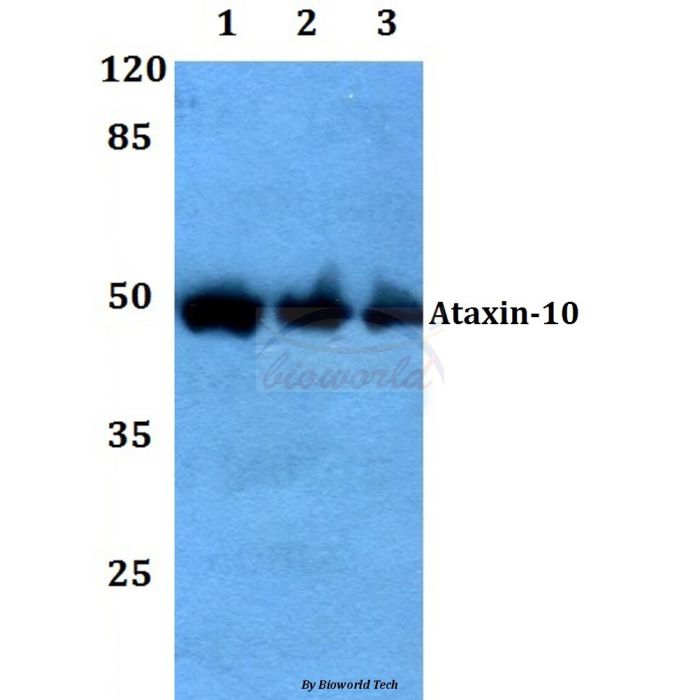Ataxin-10 polyclonal, anti-human, mouse, rat
€305.00
In stock
SKU
BS60104
Background:
Spinocerebellar ataxia (SCA) is an autosomal dominant neurodegenerative disorder characterized by ataxia and selective neuronal cell loss. SCA is caused by the expansion of a translated CAG repeat, encoding a polyglutamine tract in SCA gene products, known as ataxins. The ataxin proteins are ubiquitously expressed in nervous tissue, but are primarily detected in cerebellum, brain stem and spinal cord in the central nervous system. Ataxin-10 is a cytoplasmic protein that belongs to the family of armadillo repeat proteins. A loss of ataxin-10 in primary neuronal cells causes increased apoptosis of cerebellar neurons. Ataxin-10 interacts with p110, an O-Linked beta-N-acetylglucosamine transferase, and may be important in the regulation of intracellular glycosylation levels and homeostasis in the brain. Spinocerebellar ataxia type 10 (SCA10) is an autosomal dominant disorder that causes cerebellar ataxia and seizures. SCA10 is caused by an expansion of an ATTCT pentanucleotide repeat in intron 9 of the ataxin-10 gene.
Alternative Name:
Ataxin 10, Ataxin10, Brain protein E46 homolog, Spinocerebellar ataxia type 10 protein, ATXN10, SCA10
Application Dilution: WB: 1:500~1:1000
Specificity: Ataxin-10 polyclonal antibody detects endogenous levels of Ataxin-10 protein.
Immunogen:
A synthetic peptide corresponding to residues in Human Ataxin-10.
MW: ~ 46-53 kDa
Swis Prot.: Q9UBB4
Purification & Purity:
The antibody was affinity-purified from rabbit antiserum by affinity-chromatography using epitope-specific immunogen and the purity is > 95% (by SDS-PAGE).
Format:
1 mg/ml in Phosphate buffered saline (PBS) with 0.05% sodium azide, approx. pH 7.2.
Storage:
Store at 4°C short term. Aliquot and store at -20°C long term. Avoid freeze-thaw cycles.
For research use only, not for use in diagnostic procedure.
Spinocerebellar ataxia (SCA) is an autosomal dominant neurodegenerative disorder characterized by ataxia and selective neuronal cell loss. SCA is caused by the expansion of a translated CAG repeat, encoding a polyglutamine tract in SCA gene products, known as ataxins. The ataxin proteins are ubiquitously expressed in nervous tissue, but are primarily detected in cerebellum, brain stem and spinal cord in the central nervous system. Ataxin-10 is a cytoplasmic protein that belongs to the family of armadillo repeat proteins. A loss of ataxin-10 in primary neuronal cells causes increased apoptosis of cerebellar neurons. Ataxin-10 interacts with p110, an O-Linked beta-N-acetylglucosamine transferase, and may be important in the regulation of intracellular glycosylation levels and homeostasis in the brain. Spinocerebellar ataxia type 10 (SCA10) is an autosomal dominant disorder that causes cerebellar ataxia and seizures. SCA10 is caused by an expansion of an ATTCT pentanucleotide repeat in intron 9 of the ataxin-10 gene.
Alternative Name:
Ataxin 10, Ataxin10, Brain protein E46 homolog, Spinocerebellar ataxia type 10 protein, ATXN10, SCA10
Application Dilution: WB: 1:500~1:1000
Specificity: Ataxin-10 polyclonal antibody detects endogenous levels of Ataxin-10 protein.
Immunogen:
A synthetic peptide corresponding to residues in Human Ataxin-10.
MW: ~ 46-53 kDa
Swis Prot.: Q9UBB4
Purification & Purity:
The antibody was affinity-purified from rabbit antiserum by affinity-chromatography using epitope-specific immunogen and the purity is > 95% (by SDS-PAGE).
Format:
1 mg/ml in Phosphate buffered saline (PBS) with 0.05% sodium azide, approx. pH 7.2.
Storage:
Store at 4°C short term. Aliquot and store at -20°C long term. Avoid freeze-thaw cycles.
For research use only, not for use in diagnostic procedure.
| Is Featured? | No |
|---|
Write Your Own Review

